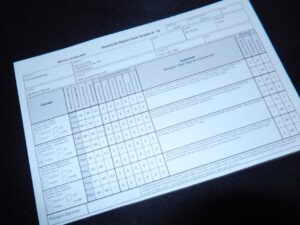How do you know if your Bible classes for kids and teens are accomplishing anything? At Teach One Reach One, we strongly encourage any Church, faith-based tutoring program or mission team to set specific, measurable goals for your classes. If you have done that, assessing the effectiveness of your program will be that much easier. Whether or not you have written goals, there are some things you need to do to assess if your program is accomplishing what God would want it to accomplish.
- Stand in the halls outside of your classrooms. Do students seem excited to be coming to class? Do you hear sounds of teachers enthusiastically greeting students and engaging them in conversation? Are your teachers even in their rooms and ready to teach before students arrive? Prepared teachers who are ready to greet their students with love and enthusiasm are an important part of any program hoping to reach kids and teens for God.
- Observe each of your classes for an entire class period. If you aren’t thrilled with what you see, go back and observe a second time to make sure it wasn’t just an off day. You should hear accurate Bible stories, students being told or asked what the godly principles in the lesson are and how to apply them in their lives, and an activity that adds meaning to the lesson, is hands-on requiring the student to process what was taught or to experience some aspect of the lesson that is unfamiliar to them and the activity should make the lesson memorable.
- Watch the students while they are in the classes. Are all of their eyes glazed over in boredom? Are there classrooms where the students are misbehaving so badly students who want to learn can’t? Do students look overly confused or frustrated? If students are exhibiting these behaviors, something in your program needs changing. It may be in the homes of your students and how you reach out to partner with them or it could be the teachers need additional training or you need new activities. Those are warning signs of a class or an entire program that is not being as effective as it could be.
- Talk to your teachers. Beg them to be totally honest with you. What do they see as the strengths and weaknesses of your program? What do they need to be more effective in the classroom? Are they burned out from teaching too long without a break? Do they need/want more training?
- Talk to your students. You will have to really beg them to be honest as most kids have learned to tell adults what they think the adults really want to hear. Ask the students what are the best things about your program. What would they change? Why? Do they believe they learn something new every time they attend? Who are the best teachers in your program and why? (Note: Sometimes teachers popular with kids are actually your worst teachers – they let the kids get by with murder. Understanding why they think a teacher is good is very important!)
- Talk to the parents of your students. Ask them what they see as the strengths and weaknesses of your programs. Who do they feel does the best job of teaching their kids new things about the Bible or reinforces godly principles in memorable ways? What can you provide them to help them extend learning at home? If they could change one thing or add one thing to your program, what would it be?
- Closely examine your curriculum and the activities it suggests. Are the ties to the Bible strong? Does it explain how to apply what is learned from the Bible in real life? Are the activities meaningful, hands-on and memorable or just silly fun? Are the activities mainly worksheets or coloring pages? With few exceptions, worksheets and coloring pages should be banned in your Bible classes (as well as most foam cut-outs while we are on the subject!) Are the students having to think about what they learned or learn new things while doing the activities or are they just practicing their coloring, cutting and gluing skills?
- Pray. I know it sounds a little strange, but talk to God about everything you learned in the earlier steps. Ask Him to provide you with clarity and guidance for what to do to help your program become more effective at reaching kids and teens for Him.
- Check with resources. Teach One Reach One provides free consultation by telephone or email. We have workshops and materials you can use – almost all of them free. What other resources do you have in your congregation or community? You don’t have to take the entire burden to make needed changes on yourself. Listen to the advice Jethro gave Moses and get some help!
- Make a plan. You won’t be able to change everything you want overnight. If you have a master list and prioritize it though, you can make huge changes over time.
Assessment is scary. Often, the kids are right. We don’t really want to know the truth about how effective our programs are at reaching kids and teens for God. We have put a lot of time, effort and money into what we have and to find out our grade is not an A+ hurts. Yet, it is important to remember your ultimate goal – helping those children and teens get to Heaven. Unfortunately, in today’s world your program may be the only Bible your students ever get. What they learn in your program will be all they learn – unless you can reach their hearts and convince them to seek God and worship and obey Him independently as they grow old enough to do so. Accomplishing that will make any sting of your current assessment fade away entirely.





